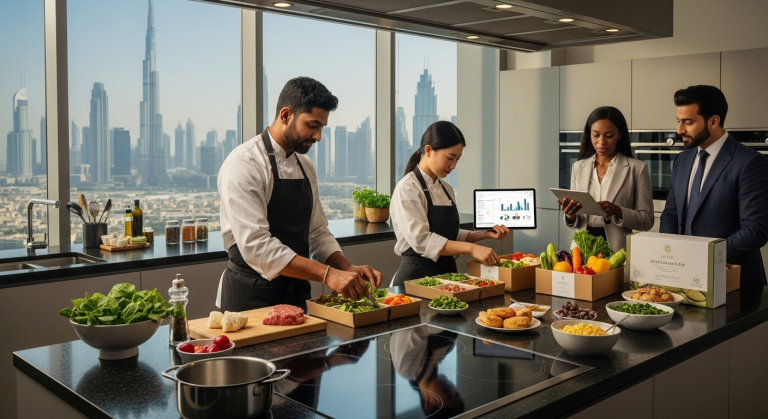Market Analysis and Opportunities
The subscription-based meal prep service industry is swiftly emerging as one of the most promising business opportunities in Dubai and across the United Arab Emirates. As consumers in the UAE—particularly in cosmopolitan Dubai—seek convenient, healthy, and personalized dining options, the rise of meal kit delivery and customized nutrition services is transforming the food and beverage landscape. To effectively penetrate and scale in this fast-paced market, a robust market analysis and precise targeting are essential.
Target Market Analysis
A subscription-based meal prep service targets urban professionals, health-conscious individuals, young families, and corporate clients seeking convenient meal solutions. In Dubai—a city home to over 200 nationalities, with a highly transient and tech-savvy population—the demand for healthy, time-saving, and diverse food options is at an all-time high.
- Market Size: The UAE’s meal delivery market was valued at approximately $834 million in 2022, with analysts projecting a CAGR of 6–9% through 2027 (Statista, Euromonitor).
- Consumer Preferences: Urban consumers value variety, dietary customization (vegan, keto, gluten-free), and reliability. Growing health awareness and busy work schedules feed into the desire for pre-portioned, ready-to-cook, or ready-to-eat meals delivered regularly.
- Purchasing Patterns: Digital ordering, mobile app interfaces, and cashless payments are primary, while subscription models offer recurring revenue and customer loyalty.
Industry Trends
- Digital Transformation: Seamless online platforms, data-driven personalization, and AI-powered meal recommendations set leading brands apart.
- Sustainability: Eco-friendly packaging, reduced food waste, and sourcing local ingredients are increasingly influencing brand choice.
- Premiumization: Gourmet meal kits, chef collaborations, and luxury dietary plans are finding traction among UAE’s affluent segments.
Marketing Needs
Market differentiation requires a multichannel approach:
- Digital Campaigns: Invest in targeted SEO, PPC, and social media advertising focused on keywords such as “healthy meal delivery Dubai,” “subscription meals UAE,” and “meal prep business in Dubai.”
- Branding: Develop a strong, authentic brand identity that reflects health, convenience, and innovation.
- Content Marketing: Publish educational content on nutrition, time-saving recipes, and wellness trends to build trust and SEO equity. Cross-promote offerings on platforms like Persian Horizon’s blog to reach a wider audience.
- Influencer Engagement: Leverage Dubai’s large influencer scene to amplify reach among young professionals and fitness enthusiasts.
Expansion Potential
- Market Segments: Expand to B2B with corporate meal plans, catering for events, or partnerships with gyms and wellness centers.
- Geographic Diversification: After establishing a loyal base in Dubai, consider entering Abu Dhabi, Sharjah, and even cross-border into KSA and GCC markets.
- Service Diversification: Offer premium tiers (e.g., organic, fitness-focused plans), adaptations for cultural occasions (Ramadan, Eid), or export of specialty meal kits to GCC neighbors.
Comprehensive Business Overview
The subscription-based meal prep service belongs to the food tech sector—a high-growth industry blending culinary expertise, logistics, and digital platforms. Operating in Dubai offers proximity to a diverse, affluent urban clientele and access to best-in-class infrastructure.
Business Model
- Recurring Revenue: Weekly or monthly subscriptions for pre-selected meal plans (customized by dietary needs).
- Direct-to-Consumer (D2C): Orders managed via a branded website/app, with doorstep deliveries.
- Operational Scope: Headquarters in Dubai (preferably a Free Zone for tax advantages), a central kitchen facility, and technology-driven logistics.
Mission, Vision, and Core Objectives
- Mission: Make healthy, delicious meals accessible and convenient for Dubai’s fast-paced community.
- Vision: Become the UAE’s leading provider of sustainable, personalized meal prep solutions.
- Core Objectives: Achieve market leadership in Dubai within 3–5 years; maintain 80%+ customer retention; operate with 90%+ on-time delivery; pioneer sustainability in meal delivery.
Business Stage and Location
Most meal prep providers in Dubai are either at the startup or growth stage. The business should be based in a Dubai Free Zone (such as Dubai Multi Commodities Centre or Dubai Silicon Oasis) to benefit from streamlined licensing, 100% foreign ownership, and world-class amenities.
Competitive Advantage
Entrepreneur’s Perspective
- Low Entry Barrier, High Demand: With appropriate funding, operational setup, and a differentiated digital platform, the market entry window remains favorable.
- Excellent Growth Potential: Urbanization and digital lifestyles ensure an expanding customer base open to innovation.
- Proprietary Technology: Developing a user-centric app with features like meal customization, AI-driven suggestions, and loyalty programs can secure recurring revenue and reduce churn.
Investor’s Perspective
- Scalability: Modular kitchen setups and digital operations allow for fast scaling into new geographic or demographic segments.
- Attractive ROI: Strong gross margins (35–45%) and recurring revenue lower investment risk.
- Exit Opportunities: The sector has seen recent acquisitions (e.g., HelloChef), suggesting potential for lucrative exits or buyouts.
Manager’s Perspective
- Data-Driven Operations: Integration of supply chain analytics, dynamic pricing, and predictive inventory management enables cost efficiency and waste reduction.
- Strategic Partnerships: Exclusive agreements with local farms, gyms, or health clinics can widen distribution and add value.
- Brand Loyalty: Subscription models foster repeat engagement and stable cash flow, easing operational planning.
Financial and Investment Needs
Financial Requirements
Startup capital and operational expenditure need careful planning:
- Setup Costs: AED 300,000–500,000 for central kitchen, licenses, initial inventory, and digital platform.
- Marketing & Customer Acquisition: AED 100,000–200,000 initial campaigns, influencer partnerships, and SEO.
- R&D and Product Development: AED 50,000–100,000 for meal innovation and user experience research.
Investment Potential
- High Demand Sectors: Given the sector’s growth trajectory and Dubai’s position as a business hub, investors can expect strong market demand.
- Flexible Investment Structures:
- Equity investment for growth and expansion phases.
- Convertible notes for early-stage funding.
- Strategic partnerships with food suppliers or tech developers.
- Attractive Payback: Proven business models in similar cities globally report payback periods within 2–3 years post-launch.
Financial Risks
- Cash Flow Volatility: Customer churn or delayed payments may disrupt cash flow; mitigated by automated billing and diversified revenue streams.
- Currency Risks: Cross-border imports may expose the business to currency fluctuations; consider hedging strategies where practical.
- High Setup Costs: Invest in phased rollouts and operational audits to optimize early capital allocation.
Human Resources and Recruitment
Workforce Needs
- Permanent Roles: Kitchen staff (chefs, assistants), delivery/logistics managers, customer support, and digital marketing professionals.
- Specialized Talent: Nutritionists, software developers (for app optimization), and supply chain analysts.
- Scale of Operations: Initial team of 15–25; expand as order volume increases.
HR Challenges
- Talent Scarcity: High competition in Dubai for culinary and tech talent; address via competitive salary packages and growth opportunities.
- Retention: Implement structured onboarding, clear career paths, and employee wellness programs.
- Training: Invest in upskilling, especially in food safety, digital systems, and customer service excellence.
Compliance with UAE Labor Laws
All employment must conform to UAE labor regulations, including:
- Visa Sponsorship: Proper visa and residency arrangements for expatriate staff.
- Contracts & Benefits: Clearly articulated employment contracts, end-of-service gratuity, and legal insurance coverage.
- Continuous Compliance: Regular review of labor law updates; seek local HR consultancy for best practices.
Infrastructure and Operations
Infrastructure Needs
- Central Kitchen: Commercial-grade kitchen space equipped for high-volume, hygienic food prep (can be leased or cloud/ghost kitchen models for lower commitment).
- Office Space: Virtual offices or co-working spaces to minimize overhead, particularly during initial stages.
- Technology: Investment in robust order management, delivery tracking, and customer feedback systems.
Operational Optimization
- Weaknesses: Manual processes, supply chain inefficiencies, and lagging delivery can impede growth.
- Improvements:
- Adopt ERP systems for streamlined procurement and order fulfillment.
- Automated inventory and demand forecasting to minimize waste.
- Outsource non-core functions (e.g., last-mile delivery) when cost-optimal.
Legal Compliance
- Registration & Licensing: Registration with DED or relevant Free Zone authority; F&B license, food safety certification, and health department inspections.
- Corporate Bank Accounts: Set up with UAE banks for clean, compliant financial transactions.
- Status Audits: Routine compliance checks; consult business setup services for tailored legal support.
Innovation and Technology
- Emerging Tech: Explore AI-driven personalization, IoT-powered kitchen monitoring, and blockchain for traceability of ingredients.
- Continuous Digitization: Upgrade digital assets regularly and pilot new technologies (chatbots for customer service, AR menus, etc.) to stay ahead.
Marketing and Branding Strategies
Brand Status
- Awareness: The UAE’s meal delivery market is crowded but lacks brands with a premium, sustainable image. Building a distinctive visual identity and consistent brand voice is key.
- Positioning: Differentiate as the healthiest, most customer-centric, or most eco-friendly meal prep solution.
Marketing Channels
- Digital: SEO-optimized website, app store presence, Google Ads, local influencers, and active Instagram, TikTok, and Facebook marketing.
- Traditional: Flyers in fitness clubs, collaborations with real estate developers (e.g., to target new homeowners or renters).
- Retention: Email marketing, referral programs, flexible subscription plans.
360-Degree Campaigns
A successful meal prep brand invests in integrated marketing:
- Example Campaign: “Healthy Ramadan at Home”—combining influencer content, targeted PPC, community events, and limited-time offers.
- Customer Interaction: Live cooking webinars, Q&As, and personalized wellness challenges build loyalty.
- Leverage Partners: Collaborate with fitness studios, health clinics, and local events for mutual promotion.
Growth and Development Potential
Growth Strategies
- Market Expansion: Launch in adjacent emirates or offer new meal plans (kids, seniors, unique diets).
- Partnerships: Team up with local food producers, delivery aggregators, and tech providers for reach and efficiency.
- Franchise Model: Once established, develop franchising options or licensing arrangements for rapid scale.
Networking
- Key Stakeholders: Build strong relationships with suppliers, delivery partners, digital agencies, and regulatory bodies.
- Government Ties: Engage with Dubai SME, Dubai Chamber of Commerce, and tap into networks like Persian Horizon leveraging regional expertise.
International Potential
- Gateway City: Dubai’s connectivity and reputation as a commercial hub position it as a launchpad for expansion into MENA, Europe, or Asia.
- Export Readiness: Package and brand specialty meals for GCC export; participate in international F&B expos for brand exposure.
Sustainability and Innovation
Sustainability is in the spotlight in Dubai’s Vision 2030:
- Eco-Friendly Initiatives: Use biodegradable or reusable packaging, source locally to reduce carbon footprint, and donate surplus food.
- Digitally Driven: Launch carbon impact trackers in the app, or offer rewards for sustainable choices.
- Innovation: Pilot plant-based, allergen-free, or nutritionally optimized menus to capture niche high-growth demographics.
Alignment with Dubai’s Market
Cultural Alignment
- Menu Diversity: Offer meal plans that cater to various dietary restrictions (halal, vegetarian, vegan) and cuisines (Middle Eastern, Asian, European) to appeal to Dubai’s multicultural population.
- Language and Service: Ensure marketing materials and customer service are available in English and Arabic, with consideration for other prevalent languages among expats.
Local Regulatory Compliance
- Commercial Licensing: Adhere strictly to Dubai Economic Department (DED) or Free Zone authority requirements.
- Tax and Labor Law: Continuously monitor for regulatory changes to avoid penalties and ensure compliance on VAT, staff contracts, and workplace safety.
Advantages of Dubai
- Business Environment: Benefit from Dubai’s tax-free regime, global logistics connectivity, and world-class digital infrastructure.
- Strategic Location: Dubai’s role as a trade gateway enables efficient import of specialty ingredients and export of branded meal kits.
- Support Ecosystem: Access business incubators, investment consultants, and government-backed funding (see investment consulting services).
Local Challenges
- High Competition: Stand out with unique offerings and superior service quality.
- Operational Costs: Minimize fixed costs via shared kitchens and technology-driven delivery optimization.
- Regulatory Complexity: Work with local consultants and legal advisors for ongoing compliance.
Conclusion
The subscription-based meal prep sector in Dubai represents a lucrative and forward-thinking business opportunity. With urbanization, shifting consumer habits, and the city’s strategic advantages, a well-executed meal prep business can achieve sustainable growth, strong returns, and brand leadership. Stakeholders—entrepreneurs, investors, and managers—should focus on leveraging digital innovation, robust branding, and strategic partnerships to succeed in the dynamic UAE market.
Actionable Recommendations
- Prioritize digital transformation, supply chain excellence, and sustainability to resonate with Dubai’s evolving consumer base.
- Leverage Free Zone benefits for 100% ownership, global access, and regulatory ease.
- Employ integrated marketing campaigns, leveraging current trends and influencer partnerships.
- Proactively address operational, legal, and HR challenges to ensure long-term stability.
- Partner with experienced consultants like Persian Horizon for end-to-end support on business setup, investment, and compliance in Dubai.
The time is now to capitalize on the rising demand for subscription-based meal prep in Dubai. Take advantage of Dubai’s unparalleled business environment and explore comprehensive service options to launch or expand a thriving venture in the UAE.







